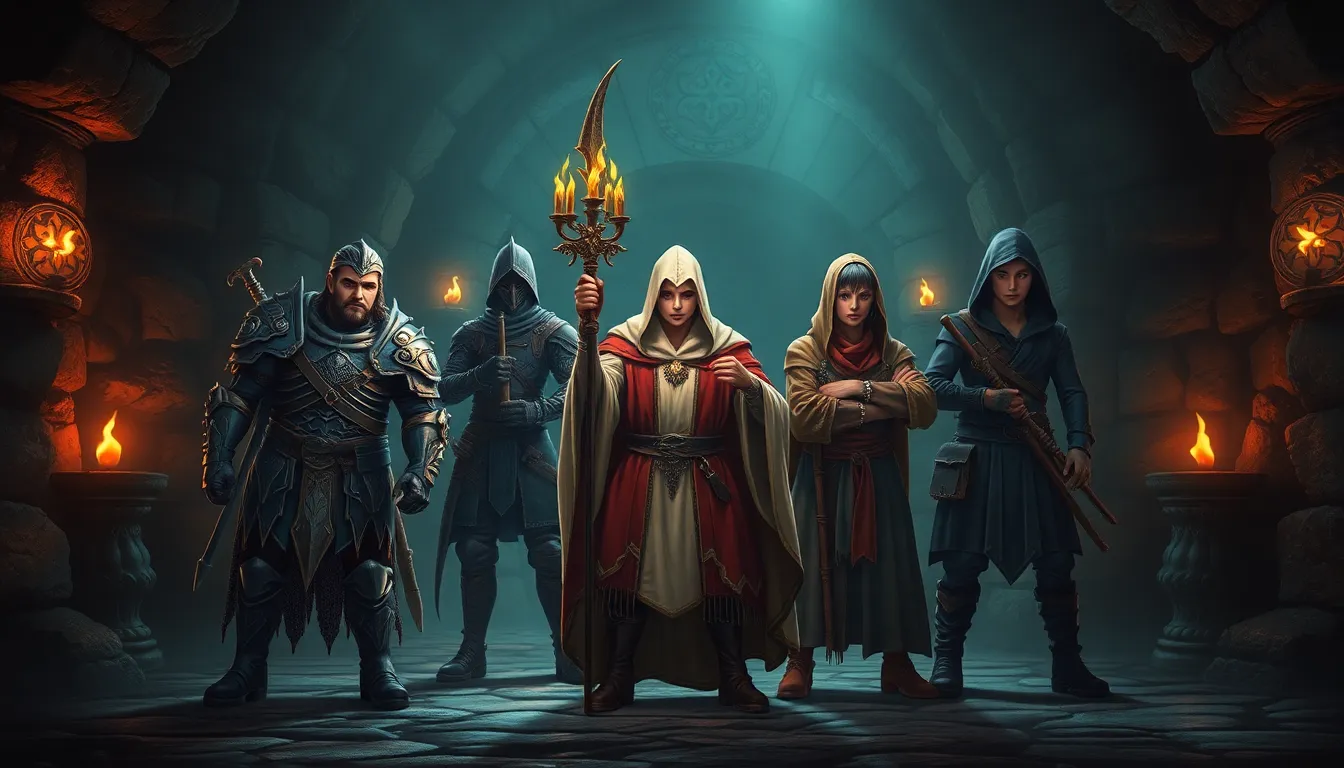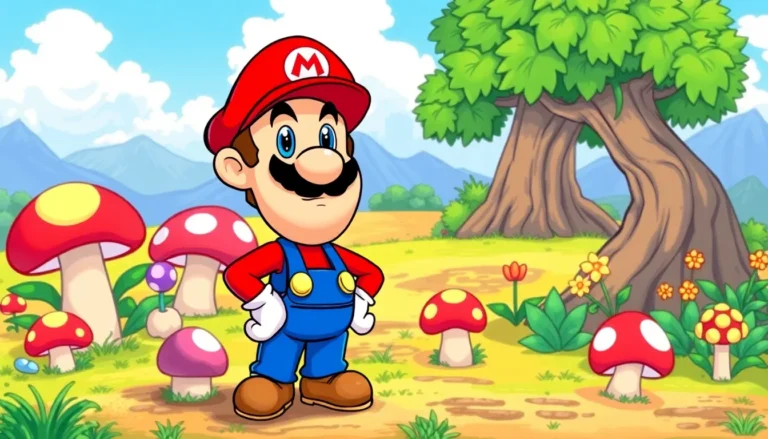Imagine stepping into a world where dragons lurk in the shadows and treasure chests are just waiting to be plundered. Dungeon RPGs offer an escape into fantastical realms filled with epic quests, quirky characters, and enough loot to make a pirate weep. Whether you’re a seasoned adventurer or a curious newbie, these games promise a blend of strategy, storytelling, and a sprinkle of chaos that keeps players coming back for more.
In a dungeon RPG, every choice matters. Will you be the noble hero saving the day or the cunning rogue stealing the spotlight? With endless possibilities and surprises around every corner, these games are not just about slaying monsters; they’re about crafting your own legend. So grab your dice, gather your friends, and prepare for a journey where the only limit is your imagination.
Table of Contents
ToggleWhat Is Dungeon RPG?
Dungeon RPG features immersive gameplay set in fantastical worlds. Players create characters and embark on quests filled with challenges. Combat, exploration, and problem-solving form the core mechanics. Strategic thinking plays a vital role in navigating dungeons and facing enemies.
Narrative-driven adventures come alive through player choices. Each decision significantly impacts the unfolding story and character development. Players often form parties, combining different classes and skills for effective teamwork. Cooperation among players enhances the gaming experience.
Game master responsibilities vary by RPG. The master guides the storyline, controls non-player characters, and creates engaging environments. Engaging storytelling captivates players, making each session unique. Environments typically include dark caverns, ancient ruins, and magical realms, all rich with lore.
Gameplay mechanics adapt according to the chosen ruleset. Systems like Dungeons & Dragons or Pathfinder provide frameworks for various experiences. Each system emphasizes different elements, such as character progression and skill checks. Players frequently enjoy customizing characters to reflect individual playstyles.
Dungeon RPGs encourage creativity and imagination. They allow players to explore diverse settings and face formidable foes. Community involvement often leads to modified rules and additional content. This engagement fosters a dynamic landscape for gameplay that evolves with its players.
Ultimately, dungeon RPGs resonate with adventurers seeking camaraderie and excitement. The blend of storytelling, strategy, and role-playing entices new and seasoned gamers alike.
Key Features of Dungeon RPG

Dungeon RPGs are packed with features that enhance gameplay and player engagement. Character development and game mechanics stand out as crucial elements.
Character Development
Character development plays a critical role in dungeon RPGs. Players create unique heroes through detailed class systems and trait selections, allowing for individuality. Advancement occurs as characters gain experience from quests and challenges, unlocking new abilities and skills. Relationships among party members also evolve throughout the journey, affecting gameplay and story outcomes. Customization options fuel creativity, helping players tailor their characters to fit their preferred playstyles. Unique backstories add depth, creating emotional connections that influence in-game decisions. Players’ choices shape their characters’ arcs, leading to dramatic transformations as the narrative progresses.
Game Mechanics
Game mechanics define the structure of gameplay in dungeon RPGs. Combat systems rely on dice rolls, strategy, and character abilities, creating dynamic encounters. Exploration mechanics encourage players to investigate environments thoroughly, revealing treasures and challenges. Problem-solving often involves puzzles and traps that require teamwork and critical thinking. Different rulesets, like Dungeons & Dragons or Pathfinder, offer varying approaches to skill checks, initiative, and combat resolution. Customization within game mechanics allows players to engage with the story more intimately. Overall, these mechanisms create immersive experiences that engage players in both action and narrative depth.
Popular Dungeon RPG Titles
Dungeon RPGs attract players with their diverse settings and engaging narratives. Two notable titles highlight the essence of this genre: Dungeons & Dragons and Pathfinder.
Title 1 Overview
Dungeons & Dragons (D&D) serves as the cornerstone of tabletop RPGs since its launch in 1974. The game encourages creativity through character customization, storytelling, and strategic gameplay. In D&D, players create unique heroes and embark on quests guided by a game master. Characters evolve via experience points, unlocking new abilities and deepening connections. The system emphasizes teamwork, fostering dynamics among party members and enhancing the overall experience. Players navigate intricate dungeons, solve puzzles, and engage in thrilling combat sequences, making every session a unique adventure.
Title 2 Overview
Pathfinder stands out for its extensive customization options and detailed rule system. Released in 2009, it builds on the D&D framework while introducing its own mechanics. Players enjoy a wide range of character classes and races, allowing for personalized gameplay experiences. The game encourages strategic planning during explorations and battles, requiring players to collaborate closely. Pathfinder’s narrative-driven approach enables choice-driven storytelling, leading to diverse outcomes based on player decisions. Rich lore fills the game world, providing depth and intrigue that keeps players returning for more adventures.
Tips for New Players
Starting in dungeon RPGs can be thrilling yet daunting. Focus on character creation first; choose a class that interests you. Each class offers unique abilities and play styles, so consider how they fit your gaming approach.
Listening to the game master proves essential. They provide valuable insights into the storyline and environment. Pay attention to their descriptions; they guide players through quests and challenges.
Collaborating with teammates enhances the experience. Form a balanced party, integrating various classes and skills. Strategy thrives on combining strengths to overcome obstacles.
Exploring the game world invites discovery. Investigate every corner, since hidden treasures and traps abound. Engaging with non-player characters can offer quests or essential lore details.
Emphasizing teamwork matters during combat. Rely on each other’s strengths, whether that’s healing, attacking, or providing support. Communicate clearly about actions and intentions to maintain coordination.
When developing tactics, adapt based on circumstances. Flexibility in strategies makes handling unexpected encounters smoother. Players should be open to adjusting their approaches based on outcomes.
Getting comfortable with game mechanics takes practice. Familiarize yourself with dice rolls, skill checks, and other systems used in your RPG. Mastering these mechanics leads to more effective gameplay.
Gather feedback regularly. After sessions, discuss what worked well and what can improve. Learning from experiences solidifies skills and helps refine strategies for future adventures.
Dungeon RPGs offer a unique blend of adventure and creativity that captivates players of all backgrounds. With their rich lore and immersive gameplay, these games foster collaboration and strategic thinking among friends. Players can explore vast worlds filled with challenges while crafting their own narratives through character development and decision-making.
As they delve into the depths of dungeons, players experience not just combat but also the thrill of discovery and teamwork. Whether they choose classic titles like Dungeons & Dragons or newer systems like Pathfinder, the journey promises excitement and camaraderie. Embracing the challenges and joys of dungeon RPGs can lead to unforgettable experiences and lasting friendships.




